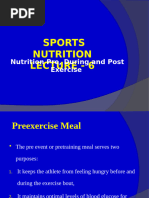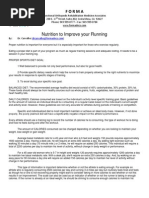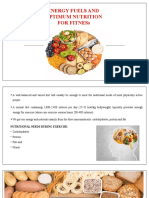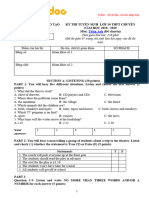Fueling Soccer Players
Fueling Soccer Players
Uploaded by
ahmad ghezelbashCopyright:
Available Formats
Fueling Soccer Players
Fueling Soccer Players
Uploaded by
ahmad ghezelbashOriginal Title
Copyright
Available Formats
Share this document
Did you find this document useful?
Is this content inappropriate?
Copyright:
Available Formats
Fueling Soccer Players
Fueling Soccer Players
Uploaded by
ahmad ghezelbashCopyright:
Available Formats
Fueling
Soccer
Players
Fueling Your Sport • Soccer players need 0.45 grams of fat per pound of body
weight per day (1 g/kg/day). Choose heart-healthy fats,
• The average distance covered in a soccer match is 5.6 such as canola oil, olive oil, and nuts.
miles (9 kilometers), so your need for calories is high in
both training and competition. Fluid Needs
• Your training schedule, the intensity of practice, and your
age will determine your calorie needs. Adult male soccer • You can lose 2 liters of fluid in sweat during games
players need 21.4 to 27.3 calories per pound of body played in moderate temperatures. In hot weather, you can
weight per day (47 to 60 calories/kg/day). Adult female lose more than 3 quarts of fluid in sweat.
players need 20.5 to 22.7 calories per pound per day • Two hours before practice or a match, drink 2 cups of
(45 to 50 calories/kg/day). A 160-pound male player fluids.
needs 3,400 to 4,300 calories per day. A 140-pound • During warm ups, drink another cup of fluid.
female player needs 2,850 to 3,200 calories per day. • At halftime, drink at least 2 cups of fluid.
• Carbohydrate is the best fuel for soccer. Eating • After the game, drink about 3 cups for every pound you
carbohydrates gives your muscles the energy they need. lost while you played. Weigh yourself before and after a
Thirty percent of all goals are scored in the last 15 game. This will give you a good idea of your sweat
minutes of the game, so choosing the right high- losses. Try to regain the lost weight within 24 hours.
carbohydrate foods and fluids can make the difference Remember the weight loss is fluid loss, not fat loss.
between winning and losing a match. • Choose sport drinks when you play in a soccer game.
• Soccer is muscle-fuel depleting activity. Losing this fuel, Sport drinks are lightly sweetened to provide
especially in the legs, contributes to fatigue as the match carbohydrates, and they taste good. Pick a sport drink
wears on. To get enough fuel, competitive soccer players with 14 to 19 grams of carbohydrate and 110 to 165
should eat 3.6 to 4.5 grams of carbohydrate per pound of milligrams of sodium per 8 ounces. The sodium helps
body weight per day (8 to 10 g/kg/day). Good sources of encourage you to drink enough fluid.
carbohydrate include whole grain breads and cereals,
fruits, and vegetables. Dietary Supplements Used by Soccer Players
• Drinking 2 cups of a sport drink at the rate of 30 to 60
grams of carbohydrate per hour during a 90-minute game • Creatine may increase your ability to train because it helps
will delay fatigue and improve performance. to provide a substance needed to fuel your muscles.
• Soccer players need to eat 0.6 to 0.8 grams of protein per • Creatine does not increase muscle cramps or injury.
pound of body weight per day (1.4 to 1.7 g/kg/day). • Creatine should not be used by soccer players 18 years of
Protein helps repair muscles and boosts your immune age or younger because it is not known whether creatine
system. Protein is also used for fuel, but it doesn’t give is safe for people in this age group.
you as much immediate energy as carbohydrate does. • Adults who use creatine should stick to the recommended
Good sources of protein include fish, chicken, turkey, beef, dose of 3 to 5 grams per day, taken throughout the day.
low-fat milk, cheese, yogurt, eggs, nuts, and soy foods
(tofu, soy nuts, soy burgers).
Copyright ©2006 American Dietetic Association. This handout may be duplicated.
Top Three Nutrition Tips to 3. Do not try to lose weight during the season.
Improve Performance Soccer is a sport that demands a lot of energy, and losing
weight makes you less able to perform at your best. A
1. Pay special attention to fluids, especially if you sports dietitian can help you lose weight during the off-
are a youth player. All soccer players need to get season while keeping your energy level high for
enough fluids to stay hydrated. It’s especially important competition.
for young players to drink enough. During exercise,
children produce more heat than adults, have lower
sweating rates, and take longer to get accustomed to hot Nutrition Prescription:
weather. When they are playing soccer, children should ______ calories per day
drink 3 to 4 ounces (about ½ cup) of fluid every 15 to 20 ______ grams of carbohydrate per day
minutes. Many children prefer cool fluids and grape- ______ grams of protein per day
flavored sport drinks. Some juices are advertised as good
______ grams of fat per day
sport drinks. However, juice contains a lot of
______ cups of fluid per day
carbohydrates so it doesn’t replace fluids effectively unless
it is diluted with water.
2. Eat well after you play. Eating for recovery soon after Special concerns:
practices and games helps you to stay energized for the
entire season. Soccer games are often scheduled close to
each other, with little time between games to refuel your
muscles. Within the first 30 minutes after exercise, eat
0.7 grams of carbohydrates per pound of body weight
(1.5 g/kg). (For a 150-pound soccer player, that equals
100 grams of carbohydrate.) Sport drinks, sport recovery
beverages, and most energy bars and gels are good
choices. Read the labels of recovery drinks to make sure
they contain carbohydrate. (Some drinks that are
advertised as recovery drinks contain more protein than
carbohydrate.)
Copyright ©2006 American Dietetic Association. This handout may be duplicated.
You might also like
- ISSA Professional Nutrition Coach Workbook100% (3)ISSA Professional Nutrition Coach Workbook141 pages
- Basic Nutrition Guide For Basketball Players PDFNo ratings yetBasic Nutrition Guide For Basketball Players PDF5 pages
- Nutrition For Soccer Student-Athletes Web VersionNo ratings yetNutrition For Soccer Student-Athletes Web Version4 pages
- (Nutrition) Winning Nutrition For AthletesNo ratings yet(Nutrition) Winning Nutrition For Athletes3 pages
- Nutr 407communicationskills-PracticumdeliverableNo ratings yetNutr 407communicationskills-Practicumdeliverable11 pages
- Lec 6 Nutrition Pre, During and Post ExerciseNo ratings yetLec 6 Nutrition Pre, During and Post Exercise28 pages
- Womens XC Pillars Updated 2019 Shorter - AfNo ratings yetWomens XC Pillars Updated 2019 Shorter - Af27 pages
- Z.diet and Nutrition For Football PlayersNo ratings yetZ.diet and Nutrition For Football Players20 pages
- Every Day Nutritionvs Game Day NutritionNo ratings yetEvery Day Nutritionvs Game Day Nutrition2 pages
- Alan Stein - Nutrition Guide For Basketball PlayersNo ratings yetAlan Stein - Nutrition Guide For Basketball Players5 pages
- Gizi Olahraga: Hesti Permata Sari, S.Gz.,M.Gizi Prodi Ilmu Gizi UnsoedNo ratings yetGizi Olahraga: Hesti Permata Sari, S.Gz.,M.Gizi Prodi Ilmu Gizi Unsoed15 pages
- Athletic Nutrition Plan: The Goal of Nutrition in A Sports ProgramNo ratings yetAthletic Nutrition Plan: The Goal of Nutrition in A Sports Program8 pages
- Practical Sports Nutrition:: Food For Athletes and Sports PeopleNo ratings yetPractical Sports Nutrition:: Food For Athletes and Sports People31 pages
- Sports Nutrition in The Martial Arts - Learn All You Need To Know About Keeping A Diet Fit For Your NeedsNo ratings yetSports Nutrition in The Martial Arts - Learn All You Need To Know About Keeping A Diet Fit For Your Needs8 pages
- Athletes Guide To Recovery and Adapation To TrainingNo ratings yetAthletes Guide To Recovery and Adapation To Training8 pages
- 12 Nutrition - Sports Nutrition - Performance Enhancing NutrientsNo ratings yet12 Nutrition - Sports Nutrition - Performance Enhancing Nutrients32 pages
- Objectives: Terms of Use Privacy Policy Notice AccessibilityNo ratings yetObjectives: Terms of Use Privacy Policy Notice Accessibility16 pages
- Đề thi vào 10 Anh TN form Hà Nội 2022 2023 ĐỀ SỐ 36No ratings yetĐề thi vào 10 Anh TN form Hà Nội 2022 2023 ĐỀ SỐ 368 pages
- Preparation of Canned Bonito Fish in Tomato SauceNo ratings yetPreparation of Canned Bonito Fish in Tomato Sauce27 pages
- Notes: Fatty Acid Make Up of Lipids of Oil SardineNo ratings yetNotes: Fatty Acid Make Up of Lipids of Oil Sardine5 pages
- Macro Raw Materials Assignment: Kim de Mesa and LJ de MattaNo ratings yetMacro Raw Materials Assignment: Kim de Mesa and LJ de Matta15 pages
- De Thi Tuyen Sinh Vao Lop 10 Mon Tieng Anh Chuyen So GD DT Ha NamNo ratings yetDe Thi Tuyen Sinh Vao Lop 10 Mon Tieng Anh Chuyen So GD DT Ha Nam12 pages
- SITHCCC013 Assessment Task 1 Global V2.2No ratings yetSITHCCC013 Assessment Task 1 Global V2.216 pages
- Composition of Foods: Raw Processed Prepared: USDA Nutrient Database For Standard Reference, Release No. 12No ratings yetComposition of Foods: Raw Processed Prepared: USDA Nutrient Database For Standard Reference, Release No. 1231 pages
- G Block Et Al - Rapid Food Screeners - Am J Prev Med - 2000No ratings yetG Block Et Al - Rapid Food Screeners - Am J Prev Med - 20005 pages
- Brain Fuel For Depression, Anxiety & Overall Mental HealthNo ratings yetBrain Fuel For Depression, Anxiety & Overall Mental Health2 pages

























































































